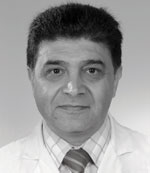Dr. Ghazi Alsbeih
UAE Awards
Hamdan Award for Original Research Paper Published in Journal of Medical Sciences
2009-2010
Personal Details
Born in 1960 in Draa in Syria, Dr.Ghazi Al Sbeih holds citizenship of Belgium. Married with two children, he speaks English, French and Arabic fluently.
Academic Background
Dr. Al Sbeih obtained his MD from the University of Damascus in 1984. His fascination for both cancer and radiation earned him a national award that allowed him to move to Belgium and France to specialize in radiation oncology. He obtained his MSc degree in 1991 and a PhD in radiobiology and radiopathology in 1995 with grand distinction.
He followed the post-doctoral training in Ottawa Regional Cancer, Canada, and MD Anderson Cancer Centre in Houston, Texas, US, where he worked on radiation sensitivity in radiotherapy patients and described the modifying radiation doses in cancer patients presumed to be radiosensitive.
Professional Milestones
He joined the King Faisal Specialist Hospital and Research Centre in Riyadh in 2000 as an assistant clinical scientist. Currently, he is senior scientist, head of Radiation Biology Laboratory and Deputy Chairman of Biomedical Physics Department. In addition to teaching radiobiology to university students and residents in radiology, radiation oncology and nuclear medicine, his current research is focused on genetic causes of radio sensitivity in the Middle Eastern population including genotyping of single nucleotide polymorphic variations; identify particular mutations in genes involved in cell cycle control and DNA repair, the possible association of these genetic variations with cancer predisposition, and the application to predictive assays in radiation oncology to improve local tumor control and reduce normal tissues’ complications.
He published more than 40 manuscripts in reputed journals such as Radiation Research, International Journal of Radiation Biology Oncology and Physics and Clinical Cancer Research. He is a member of the Radiation Research Society, the European Society for Therapeutic Radiology and Oncology (ESTRO), the American Association for Cancer Research and the executive committee of Middle-Eastern Association for Cancer Research (MEACR). He is the Chairman of the Animal Care and Use Committee and the Research Centre Safety Committee and member of KFSHRC Research Advisory Council and a number of research and educational committees.
Responsibilities and Assignments
• Chairman, Research Centre Safety Committee, KFSHRC, since January 2010
• Chairman, Research Centre Ad Hoc Safety Committee, KFSHRC, January 2009 – January 2010
• Chairman, KFSHRC Animal Care and Use Committee (ACUC), since 2005
Awards and Recognitions
He won eight national, regional and international awards.
• 2nd Prize for the KFSH&RC best annual publication of the year 2009, Riyadh, Saudi Arabia 2010.
• SIT Award 2009, 55th Annual Meeting of Radiation Research Society (RRS), Savannah, Georgia, USA.
• Travel Award, 13th Int. Congress of Radiation Research (ICRR), San Francisco, California, USA.
• SIT Award 2006, 53rd Annual Meeting of Radiation Research Society, Pennsylvania, USA.
• Student Travel Award, Radiation Research Society (RRS), Louisville, Kentucky, USA .
Title of the paper
Genetic Polymorphisms, Protein Expression and Complications to Radiotherapy in Saudi Cancer Patients Journal of Medical Sciences (2009); 2(2): 73-84 Ghazi Al Sbeih, Medhat El-Sebaie, Najla Al-Harbi, Khaled Al-Hadyan, Muneera Al-Buhairi, Martha Torres and Nasser Al-Rajhi et al
The research study by Dr. Ghazi Al Sbeih et al. was published in the Journal of Medical Sciences (JMS) in 2010.
Cancer is the most common cause of death worldwide. Most patients with cancer receive radiotherapy as a treatment. However, many of them suffer from serious side effects of the radiation. Predicting severe reactions to radiation could improve the quality of life of cancer survivors. Al Sbeih and colleagues carried out a pilot study in Saudi cancer patients. They investigated protein inductions and variations in genes involved in tissue responses to radiation. They then correlated their findings to the severity of radiation-induced tissue damages. The patients included in the study had head and neck cancer. The results show the adverse tissue reaction to radiation is linked to genetic variations (single nucleotide polymorphic variations in the cell cycle control and to DNA double-strand break repair genes).
The research study is being recognised through the Hamdan Award for Original Research Papers Published in the Journal of Medical Sciences.

